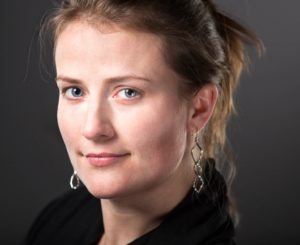We are delighted to be able to bring you the first in interview for our Emerging Investigators Series in Environmental Science: Processes and Impacts!
 Cora completed her undergraduate and doctoral studies in the Department of Chemistry at the University of Toronto. Under the supervision of Prof. Scott Mabury, her Ph.D. research focused on the atmospheric chemistry of polyfluorinated compounds and their role as long-lived greenhouse gases and sources of persistent compounds to the environment. She went on to a postdoctoral position in Boulder, CO with Dr. Steven Brown at the University of Colorado and the National Oceanic and Atmospheric Administration (NOAA). There, she developed novel, state-of-the-science instruments and used them to measure reactive atmospheric trace gases and determine their impact on the oxidative potential of the atmosphere. Cora joined the Department of Chemistry at Memorial University as an Assistant Professor in September 2012.
Cora completed her undergraduate and doctoral studies in the Department of Chemistry at the University of Toronto. Under the supervision of Prof. Scott Mabury, her Ph.D. research focused on the atmospheric chemistry of polyfluorinated compounds and their role as long-lived greenhouse gases and sources of persistent compounds to the environment. She went on to a postdoctoral position in Boulder, CO with Dr. Steven Brown at the University of Colorado and the National Oceanic and Atmospheric Administration (NOAA). There, she developed novel, state-of-the-science instruments and used them to measure reactive atmospheric trace gases and determine their impact on the oxidative potential of the atmosphere. Cora joined the Department of Chemistry at Memorial University as an Assistant Professor in September 2012.
Read her Emerging Investigators article “A 14-year depositional ice record of perfluoroalkyl substances in the High Arctic“, which is featured in Issue 1 of the journal, and find out more in the interview below:
Are you within 10 years of receiving your PhD? Do you have an independent research career? Then you could be eligible for our Emerging Investigator Series! find out more at rsc.li/emerging-espi
Your recent Emerging Investigator Series paper focuses on improving the understanding of transport of perfluoroalkyl substances in the High Arctic. How has your research evolved from your first article to this most recent article?
One of my first papers as a graduate student also involved looking at long-range transport of perfluoroalkyl substances to the Devon Ice Cap and was published ten years ago. As instrumentation improves and we develop better analytical methods, we are able to learn so much more about how pollutants impact our environment. We were able to look at four times as many chemical species as the original study, which greatly increases our understanding of the environmental fate of these compounds. We have also expanded our research network to include Northern community members and Arctic researchers with complementary expertise, which allows us to interpret and apply our results more effectively.
What aspect of your work are you most excited about at the moment?
We have some new environmental field and laboratory samples, including ice cores and biomass burning smoke samples, that I am excited to analyze using analytical techniques recently developed in my group.
In your opinion, what is the biggest impact to the environment presented by perfluoroalkyl substances?
Perfluorinated compounds have no natural degradation pathways in the environment. When we emit these chemicals to the environment, they will remain for the foreseeable future. We know that many perfluoroalkyl molecules bioaccumulate and could affect the health of humans or animals, which is cause for concern because there is no going back to an environment uncontaminated with these chemical species.
What do you find most challenging about your research?
I find field work simultaneously the most rewarding and the most difficult aspect of my research. Addressing environmental chemistry questions often means challenging collection of samples (such as those from ice caps) or the design and/or operation of complex instrumentation under harsh conditions.
In which upcoming conferences or events may our readers meet you?
Canadian Chemistry Conference and Exhibition in Toronto, Ontario (June 2017) and Healthy Buildings Europe in Lublin, Poland (July 2017). I can also be found online at cjygroup.com and on Twitter @SVOCora.
How do you spend your spare time?
I don’t have too much of it right now! When I do have free time, I enjoy travelling, walking, hiking, reading, and yoga.
Which profession would you choose if you were not a scientist?
It’s hard to imagine my life without science! If I wasn’t a scientist, I would want to do something that still involved science, like science communication or conservation management.
Can you share one piece of career-related advice or wisdom with other early career scientists?
Seek out a supportive career network of mentors, collaborators, and colleagues. I have been fortunate to have wonderful mentors from my doctoral and post-doctoral work, and throughout the environmental chemistry community. My excellent collaborators from other academic institutions, Environment Canada (who were collaborators on this project), and National Oceanic and Atmospheric Administration improve the quality and impact of my research and make it more fun to do!
To find out more about the series and submit an article, click here.











